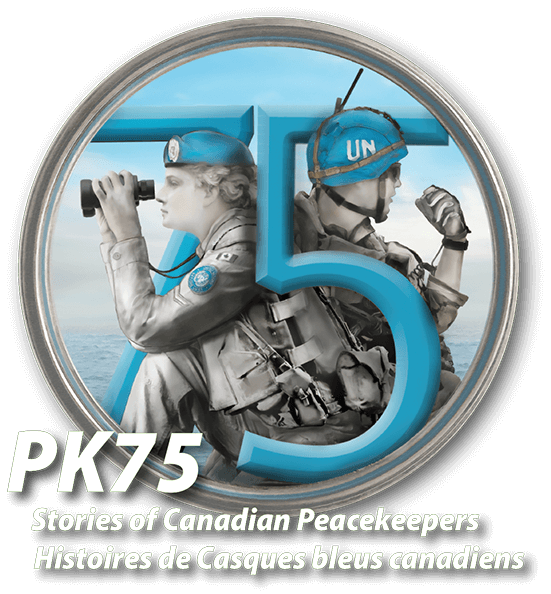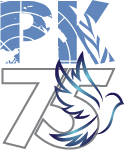

Grand-Mère (Shawinigan), QC, Canada
André Beauséjour
Current Location: Québec, QC, Canada
In May 1960, while stationed at the Valcartier Hospital as a Captain Medical Officer, I received orders from the Director General of the Medical Service (DGMS) to go to Gaza to serve in the United Nations Emergency Force.
Having been married for three years and having a two year old child, it goes without saying that my wife and I were disappointed, especially since the departure for Trenton was on our wedding anniversary, June 7. Departure by train. Arrived in Trenton the next day. Paperwork. Vaccines. Will. Then travel from Trenton to Gander in an uncomfortable, unsound DC3. Stopovers in Gander, Lisbon, Pisa, Athens, Cairo and finally arrival at the United Nations airport in El Arish. The noise and lack of pressure in the plane had deafened us for 48 hours to the point where we were getting out of the plane with our mouths open and looking stupid.
A doctor from Rafah was waiting for me with a Citroën 2hp and driver and we made the 25 km trip from El Arish to Rafah where the Canadian hospital was located. In fact, this tented hospital was more of an infirmary with 20 beds and the real hospital of that name in solid walls was run by the Norwegians. The main activity of the Canadian medical post run by Major Babineau at the time was the outpatient clinic (MIR) for the Canadian military and Palestinian personnel in the camp, for which reason we had the services of a permanent interpreter. The resources and medical equipment were adequate and I have good memories of working there.
So Rafah camp was in the middle of the desert. Surrounded by barbed wire and watchtowers. Armed Swedes were guarding it. The officers’ quarters were comfortable being those of a former British garrison. Pleasant and very socially useful officers’ mess, shared between Canadian and Indian officers. During my stay I had three weeks holiday in Beirut, Cairo and Jerusalem. And as a doctor, two consulting trips to Tel Aviv. In addition, I spent three weeks in Sharm El Sheikh as a doctor in the Norwegian army garrison; very friendly and good company.
The Canadian regiment Fort Garry Horse had the task of patrolling the Israeli/Egyptian border to prevent any conflict. In fact during my 6 months of service I was not aware of any conflict. At that time the belligerents were very respectful of the blue berets. The Palestinian support staff did their job very well as cooks, orderlies and helpers of all kinds. And, in general, the respect was mutual between us and them. Relations were relatively good between the Egyptian government, the Egyptian army and us. But Nasser didn’t want a regiment with the word ‘Royal’ on it, or the display of the Canadian flag where the British flag was then.
For health reasons, I had to leave Egypt in December 1960, leaving great friends and good memories behind, to resume my post at Valcartier. Before my departure, I was presented with the United Nations Emergency Force medal.
Biography
Born in 1932 in the small industrial town of Grand-Mère (Shawinigan), QC to a family of 10 children. Father was a city accountant, mother a journalist and writer. After my primary education, I did my classical Latin-Greek course at the seminaries of Trois-Rivières and Joliette. It was there that I heard about the COTC (Canadian Officer Training Corps) and joined. I spent the summer of 1952 at the Citadel in Québec City for basic training at the Royal Canadian Infantry School (RCS of I). Hard training but in a magnificent place. Then in 53 I went to Shilo in the field artillery (RCA). I received my commission as an artillery officer in November 1953.
As I entered medicine at Laval University in Québec in September 1953, I became a member of the Medical Corps (RCAMC) while remaining in the COTC. In 1957 I joined the active army as a captain medical officer. I was stationed at Valcartier, the military hospital in Québec City, the Covefield in Québec City, Gaza and Churchill. I passed my exams from Captain to Major in September 1962 in Borden and was promoted to A/Major a month later. I ended my military career as Officer Commanding (OIC) of the Valcartier Hospital in May 1963. Later I specialized as a child psychiatrist and practiced mainly in Québec City for 27 years without having left a small corner for general medicine and keeping good memories of my military activities.
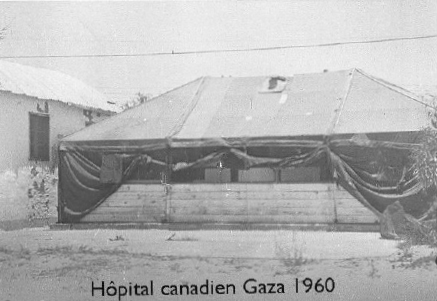
Canadian Hospital, Gaza, 1960.
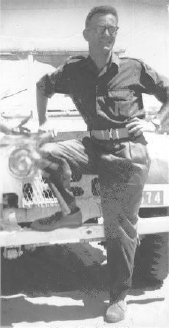
André Beauséjour in the Sinai Desert, 1960.
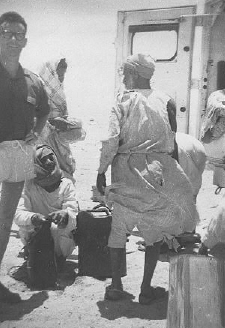
André Beauséjour with Bedouins in the Sinai Desert, 1960.


